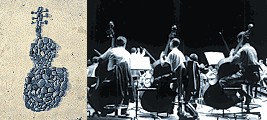 |
 |
    |
 |
 |
|
|
(une)
Ouverture
concerto for clarinet and orchestra
For
years now I've wanted to write music about the fire phases of mourming:
Denial,
Anger, Bargaining,
Depression and Acceptance.
I jumped at the
chance when Jean-Marc Bador, the director of Brittany's Regional
Orchestra, l'Orchestre de Bretagne, and Claude Guinard, the director of
the Tombées de la Nuit Festival asked me to compose a creation
especially for the festival. Bruno Fontaine as conductor and Paul Meyer
as clarinet soloist were obvious choices for my project.
These five phases of grief are a real idea to grapple with, so central to human experience that I've always wondered why no composer has addressed the theme before. Any try at describing the inner and inevitable path one must find and follow to live through grief to make life once again possible after a loss is obviously highly subjective. There's an aspect far beyond the simple question of death; it's more about confronting Separation. Life brings necessary renouncements to us all: daily, never-ending change. Driven by our will to live on the one hand, which excludes giving up, we still must confront what we have to renounce or else lose ourselves in the process. The examples run from the smallest disapointments to the cruelest fatalities. A quote from Marguerite Yourcenar in the liner notes of my CD « La Divine Nature des Choses » puts it all in very humane terms. These same themes of loss have always been present in my creations; there's no break between this and my previous works. My idea when writing has always been to put sincerity first, put depth first, the central and dominating idea being to underline the situation of humanity faced with the impossible confrontation of loss; the abyssal absence of meaning when meaning abandons us and Belief is not enough... A re-emergence of religious sentiment is taking place today on our fragile planet, the mounting fundamentalism of all sorts of groups, all united in a certain blind folly where inhuman behaviour is the common denominator. Refusing fatality, even if only in our simple workaday lives, becomes the meaning of life here and now on Earth, together. J-Ph
G
december 2004 |
Musiques
de
l'Instant
(Revivals for orchestra)
For
the
first part of my new work entitled « (une) Ouverture
» I've taken advantage of the opportunity to revisit some of the
pieces from my previous CDs.
I've always rejected the separation of music into strict, separate genres, looking rather to express myself as clearly and as accessibly as possible and thus paying minimal heed musical categories. I deliberatly center my implication as a writer on how music is perceived as it's being listened to rather than how it came to be or under which banner it may be labelled. Then could one call my music naïve music, a new genre unto itself? Whatever you call it, creating this music has led me to the very edges of trends and commonly accepted labels and has thus kept me clear of the schizophrenia of marketing, leaving me a free and unattached creator. First part of the concert is then more than simple reorchestration but rather a whole new look at, a sort of snapshot of my work over the past few years. The time elapsed between its original writing and playing it today has led me to new horizons. The meeting between my own new perspectives and opportunity to have these pieces played by Brittany's Regional Orchestra (Orchestre de Bretagne) has called forth other arrangements. That's why I've chosen to reformulate them for this precise, ephemeral point in time, transforming them into a natural prelude to the last part of the concert, an élan towards a new musical opening. J-Ph G
april 2005 Vies
actives /
vie fictive (2001)
Cellui au cœur vestu de noir (1996) total Balthazar (1996) La dernière marche (2001) Allemande (1992) Sic transit gloria mundi... (1994) Groove pragmatique (1992, création) Picnic music (2001)  |













